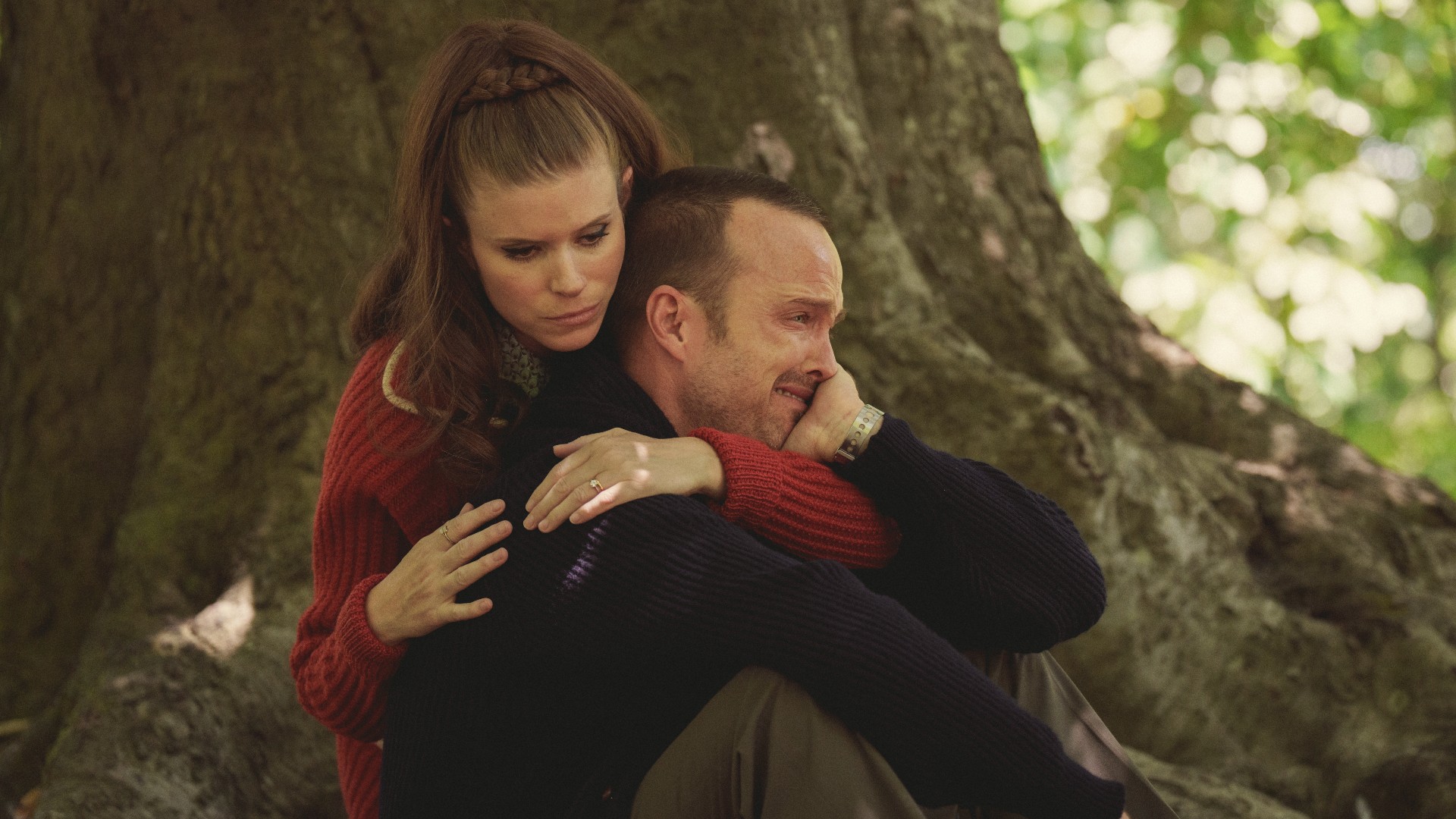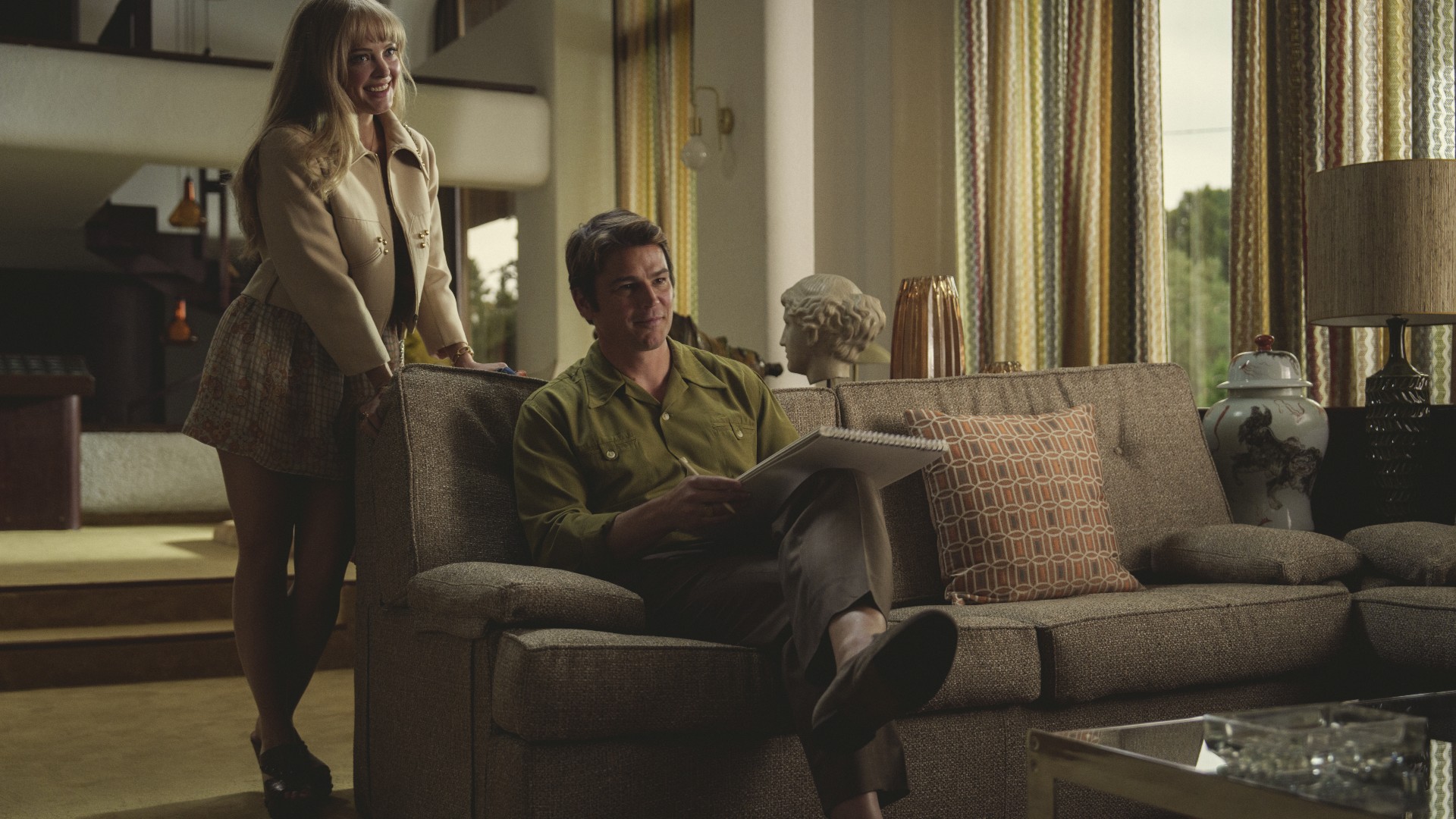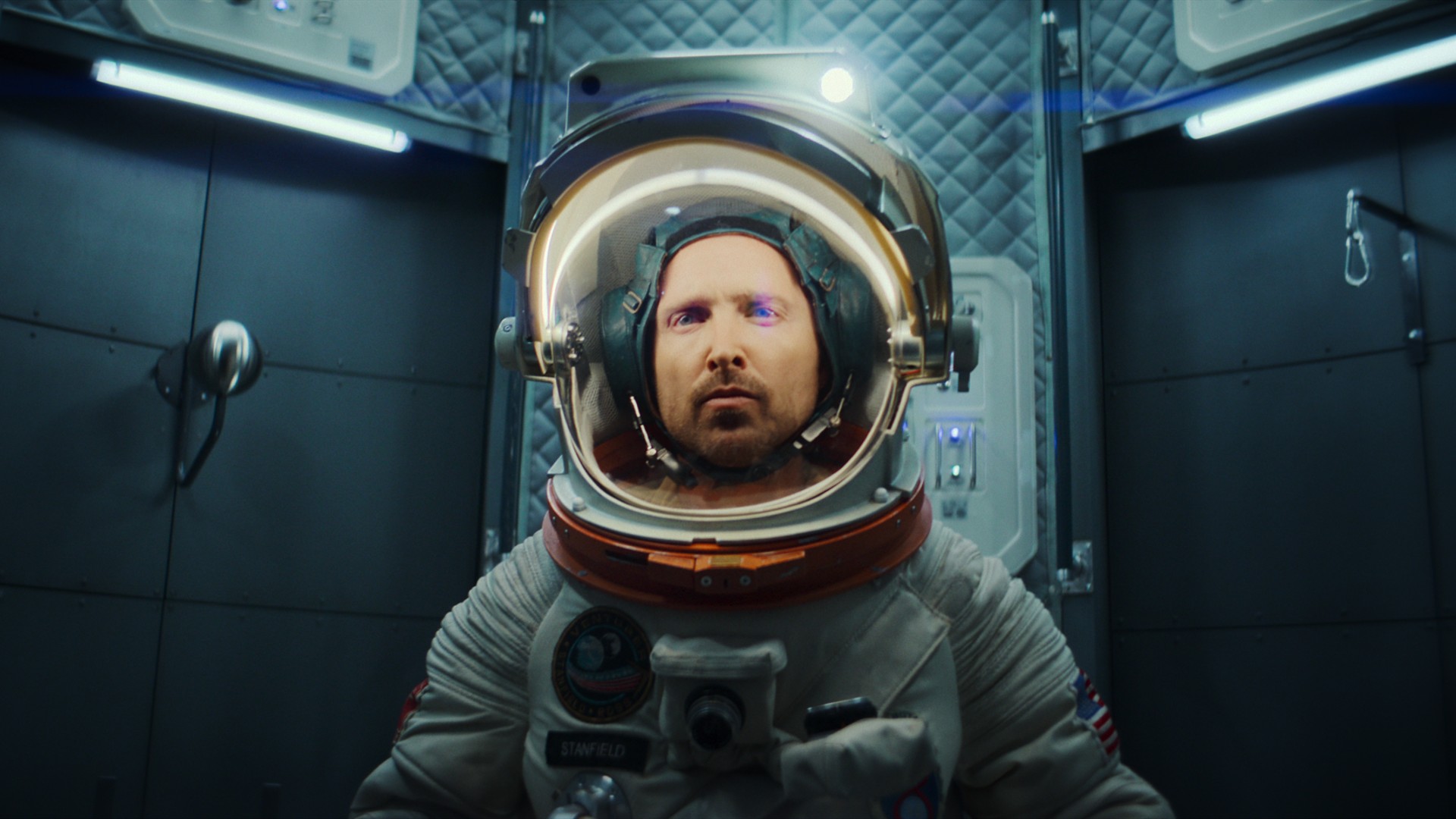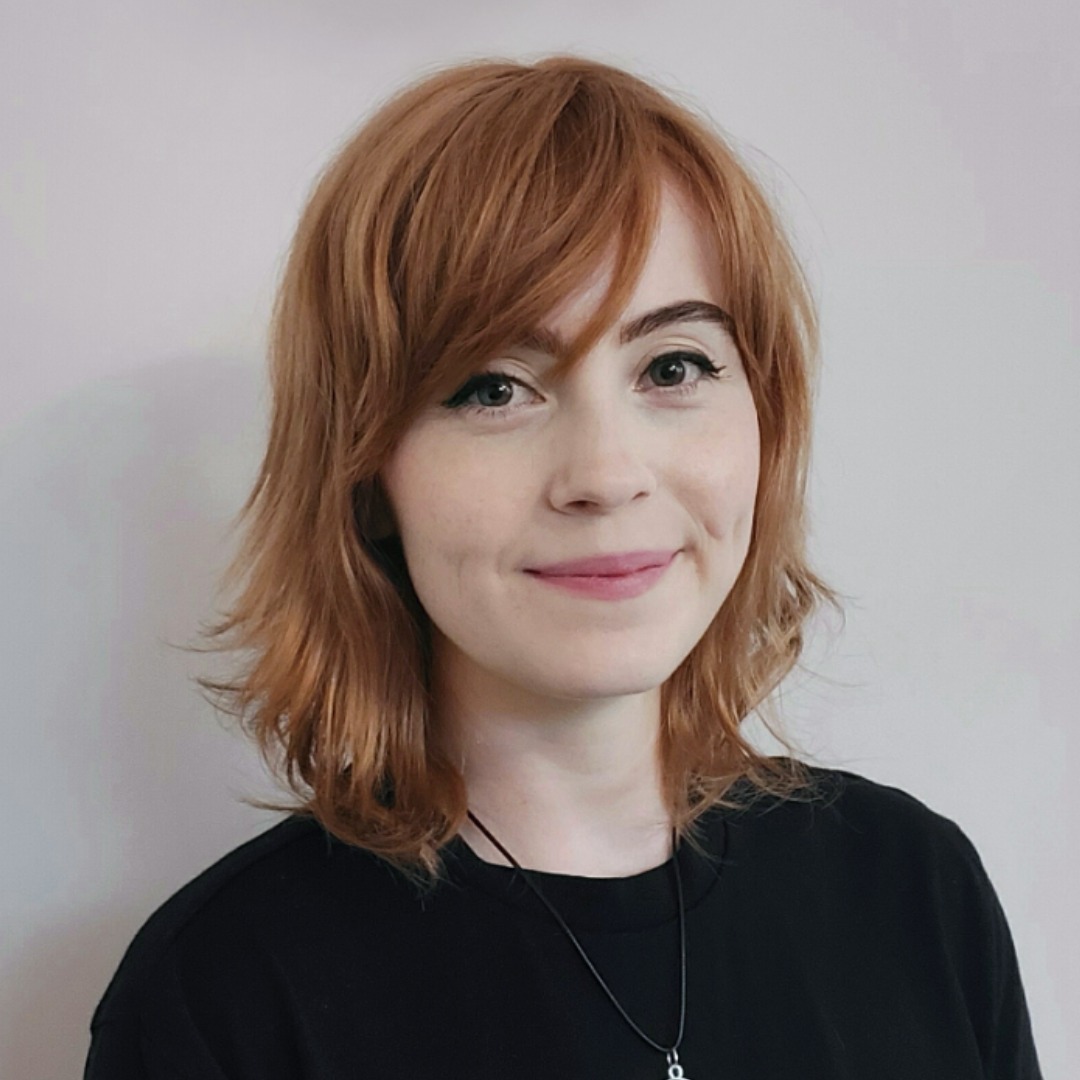
This article contains major spoilers for Black Mirror season 6 episode 'Beyond the Sea'. If you've yet to tune in, and don't want to know anything that happens, then turn back now!
Black Mirror fans are used to being shocked by twists, or being made to awkwardly giggle as the hit Netflix show explores society's darkest secrets, deepest insecurities, and often crippling dependence on technology. They're not so used to having their hearts ripped in two; cue 'Beyond the Sea', the 80-minute gut-puncher from its new, sixth chapter.
Written by creator Charlie Brooker and directed by Brooklyn's John Crowley, the episode is a slow-burn somber affair as it follows Cliff (Aaron Paul) and David (Josh Hartnett), two astronauts who split their consciousnesses between Earth and the space station they're keeping operational. While the pair's real bodies stay among the stars, the twosome regularly rig themselves up to devices that send their minds to their droid doubles elsewhere; tender family man David to his wife and two children in LA, and dismissive, closed-off Cliff to his equivalent in the secluded countryside.
One fateful night, David's home is broken into by an anti-replica cult, led by Rory Culkin's Kappa – and obviously inspired by the Manson Family. Despite his best efforts to protect his loved ones, the radicals violently murder his family before disabling his robot, leaving a grief-stricken David stuck in space.
"I feel like Charlie wrote it during lockdown, and he was exploring the concept of loneliness... the concept of touch... the concept of interpersonal connection, and the opposite, too," Hartnett explains to GamesRadar+. "What happens if someone is left without?"
To prevent David from doing something drastic (and jeopardizing his own safety), Cliff suggests his workmate use his "link" to escape the confines of the ship. But when David, in Cliff's body, starts to get close to Cliff's wife Lana (Kate Mara), tensions rise between the trio. After mistaking their shared interest in painting and reading for romantic interest, David, as Cliff, makes sexual advances towards Lana, claiming that she's clearly unsatisfied in her passionless marriage – and gets quickly rebuffed. When Lana tells Cliff, he forbids David from using his link again, stating that Lana is his and his alone. Incensed, David later pretends there's a problem with their base and while Cliff is outside tinkering with the perfectly-fine satellite, David steals his tag, sends "himself" to Lana and Cliff's son, and kills them.

The episode ends with Cliff, realizing that David paid his family one last visit, "rushing" home and stumbling through his bloodied house, before witnessing the horrific results of David's jealousy – something we, as viewers, are not privy to – and falling to his knees. It's not a rug pull, but a harrowing final note in one of Black Mirror's most tragic tales.
Bringing all the latest movie news, features, and reviews to your inbox
"I didn't see this as like a white hat, black hat... you know, bad guy thing?" Hartnett adds. "I saw it as like, It could have happened to anybody, either of them. Maybe the reaction would have been similar in both directions. Just, you know, the pressures of being completely and utterly, utterly isolated are so intense and have a significant effect on your mental health. I just found it to be wonderfully explorative."
"Do I think it has a moral?" he ponders aloud, when we mention that the show often deals in parables and this is, perhaps, one of its more ambiguous stories. "I don't know. Maybe just be kinder to the people you're around? Give them as much love and affection as possible because we all need it... but that seems way too trite!"
"The reason I wanted to be a part of it was because I love being able to explore relationship dynamics and the things that we all need as human beings," Mara adds. "I think it's super universal that everybody wants to feel love and experience love and to feel seen, and it doesn't matter what time period you're in or where you are. Everyone has that really intense desire and when you don't feel that way, it's interesting to see how that affects you and your life."
Due to the events of the episode, Hartnett filmed most of his scenes inside a cramped, futuristic set, while Mara was immersed in the '60s. Since its premiere in 2011, there's been less than a handful of Black Mirror episodes that take place in the past. 'San Junipero', while technically set in the near future, follows its characters throughout the '80s, '90s, and early '00s, while the show's interactive special, 'Bandersnatch', centers on a programmer in the summer of 1984. Season 6, the hit Netflix show's latest chapter, features three tales that are period-set – 'Mazey Day', in 2000; 'Demon 79', in, well, 1979, and 'Beyond the Sea', a decade before that.
"It reminds me of being a kid, whenever you're able to do any sort of project that takes place in another time and everything looks different, and you look totally different," Mara fondly recalls. "You're wearing different clothes, driving different cars. At one point, we were filming in this little town that they'd totally converted to make it look like it was the '60s and really I felt like I was a child again; playing in this magical world. I felt like, 'I have to pinch myself that this is my job. This is so awesome.' So I loved that aspect of it. We had the most beautiful sets and, you know, the hair and makeup and the wardrobe? All of that, it really does help put you in a different mindset."

"We had this production designer, this genius guy named Udo [Kramer]..." Hartnett interjects. "They staged the set in a way where it was just a little too small, then they cast me and I'm six foot three. I couldn't get through the doorway without looking like I was about to break in half, and it was fun. It really informs your whole performance, when you're able to interact with your environment like that as opposed to it being CGI or on green screen. I think it helps enormously. I really enjoyed it."
It's hard to imagine anyone enjoying embodying characters living through such despair, albeit make-believe, during the episode's shoot. According to Mara and Hartnett, though, they had a giving scene partner in Aaron Paul, which made even the more intense moments "a joy" to film.
"Anytime he got any sort of direction, he's just always open to explore whatever and he's just a really positive person and a lovely person," Mara says. "He's really open to try different things in all the scenes that we had to do.
"It's a joy to go to work when you're working with people like Aaron and Kate and John Crowley, the director," says Hartnett. "Despite the subject matter, we had a really nice time making the show. Aaron, in particular, is such a sweetheart and he's so open and positive. He's the most positive person I know. His texts always end with like, a bunch of hearts." We suspect he means the whole heart emojis, and not the broken ones.
Black Mirror season 6 is streaming now. For more, check out our interview with Charlie Brooker and Jessica Rhoades or our list of the best Netflix shows for some extra viewing inspiration.
I am an Entertainment Writer here at GamesRadar+, covering all things TV and film across our Total Film and SFX sections. Elsewhere, my words have been published by the likes of Digital Spy, SciFiNow, PinkNews, FANDOM, Radio Times, and Total Film magazine.



